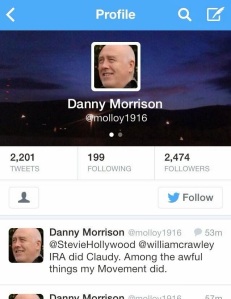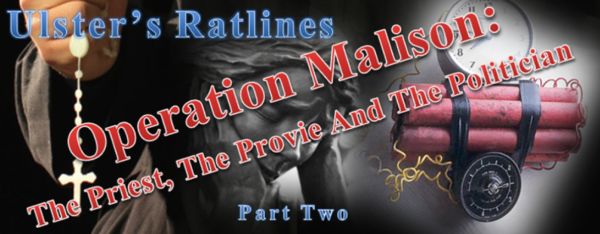
Claudy Bombing
” An explosion too loud for your eardrums to bear
Young children squealing like pigs in the square
All faces chalk-white or streaked with bright red
And the glass, and the dust, and the terrible dead”
“For an old lady’s legs are blown off, and the head
Of a man’s hanging open, and still he’s not dead
He is shrieking for mercy while his son stands and stares
And stares, and then suddenly – quick – disappears”
“And Christ, little Katherine Eakin is dead
Mrs. McLaughlin is pierced through the head
Meanwhile to Dungiven the killers have gone”
At around 10.15 am, the explosive filled car planted by the priest Chesney detonated in front of McElhinney’s Bar and grocer’s, where Elizabeth (Tracy) McElhinney was at the petrol pumps, on the village Main Street. This popular woman received the full force of the blast, as she was just two meters from the car bomb. She had worked as the local village nurse and is said to have been at every birth and death in the previous decades. She had loved life and to help others, now she was dead.
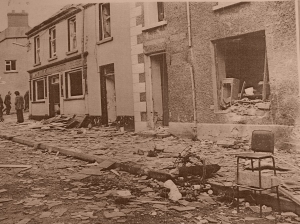
One local old age pensioner sobbed as he recalled her and the goodness she showed to others:
“She was the nicest women on God’s earth and it didn’t matter who you were, she couldn’t do enough to help you. She didn’t deserve the like of that. Ah Jesus, but it was a dirty thing they did this morning.”
Another would recall how she had cared for him after a car crash, “I had a car accident and it was Tracy McElhinney who nursed me back to life. I’ll never forget her for that.”
Across the street, a vibrant and beautiful nine year old girl was busy helping with chores at the family shop. Those with her, lives would soon change for ever; the pain unleashed that Monday morning would still be as fresh forty years on. Katherine Ekin was cleaning the windows of the shop when the bomb exploded. Her brother, Mark, who was playing on the bonnet of one of the car bombs just before it detonated, would state:
“There was an almighty bang and the next thing I knew was I was out on the street and when I turn round Katharine was lying on the foot path. She wasn’t moving at all”.
He would then state “everything that I knew of Claudy was gone.”
His mother would say later that she heard the bang and in the shock and confusion was screaming, she then said, “Then her grandfather came over and said ‘I was with her at the end’ I didn’t understand, the end of what?”. Merle Eakin would talk of never seeing her daughter married or grandchildren. Mark would say after her death that “she missed out on the life of her daughter.”
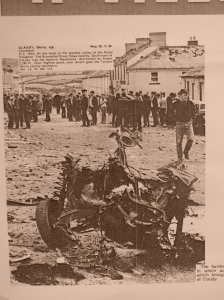
Pearl Donley related that all was normal, then, the carnage ripped through the village without warning. She was seated beside her husband in the front of their car, parked on Main Street, when a relative spotted them, Joseph McCloskey, and walked across the road to talk to them as his child was in the car with them. She tells of the monstrous wickedness as it unfolded:
“He was our brother-in-law and we had his little boy Emmett, who is only four, with us in the car. Joe was standing at the car window chatting when there was a terrible bang. He just disappeared.”
The husband of Pearl, Patrick, told of what happened to Joseph McCoskey, “He was blown across the street” and would go on to state “The blast catapulted me from the car but Pearl and I were lucky to escape with only cuts and bruises.”
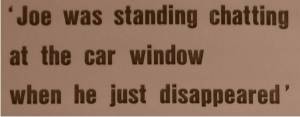
The toddler Emmett escaped injury but the witnessing of his father’s horrific murder at such an early age most have been traumatic beyond comparison.
A local grocer, Terence Peoples, ran to the seat of the blast at McElhinney’s Bar, he recalled:
“People were squealing in terror. A woman was in the street ablaze. It was terrible. I was afraid for the safety of my three children and ran home to get them clear before any more bombs went off.”
A Belfast police sergeant, who was on holiday in the village, Des Jones, watched as the mayhem was unleashed. He told of how “There was panic and confusion everywhere” and would say “I could see people dead and mutilated”.
At the first bomb, three had been murdered; nine year old Kathryn Eakin, fifty nine year old Elizabeth McElhinney and Joseph McCloskey. Scores lay wounded and three more would die of critical injuries sustained in the first blast in the coming days. They were Rose McLaughlin, whose murder orphaned eight children, Patrick Connolly and Arthur Hone.
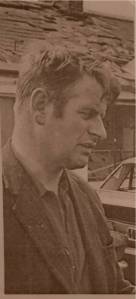
Des Jones
After the initial explosion, Des Jones’ experience on the streets of Belfast kicked in. He started to move the people away from the blast area, while doing this he looked for vehicles that might contain further devices. He would later say:
“After the first explosion I searched the street in case more bombs were concealed in other cars. I saw one car with a ten gallon milk churn inside. There were two wires leading an alarm clock and covered by a black coat. I tried to lift the bomb from the car but it was too heavy and I decided to leave it. I then warned the people to get away from the spot. Moments later the bomb went off.”
One local recounts that as he was about to enter the Post Office to collect his pension when he heard the first bomb go off. He then told of how he was next to the premises when he heard: Get t’ll hell out of it. There’s another bomb.” He said he then “ran as fast as he could”. Only for Jones warning he would have, no doubt, be blown to bits. Others were not as lucky.
Noel McFeily, a local said that:
“After the first explosion everyone rushed down the street towards the second car bomb. But Sergeant Jones shepherded them back and must have saved many lives by his action.”
As the warning was being shouted by Des Jones, a bomb detonated at the front of the Beaufort Hotel, those who had sought safety from the first bomb and the discovery of the device at the Post Office were caught in the 250 pound blast. Three would die. One, William Temple, a sixteen year old from a neighbouring village, had been injured in the first blast but continued to work on as milkman’s helper. He had just left the Beaufort Hotel, after leaving a milk order, where he had told its owner, Mrs Hamilton, of his lucky escape minutes before. It was his first day of his first job. He was blown to bits just outside as he still tried to deliver milk.
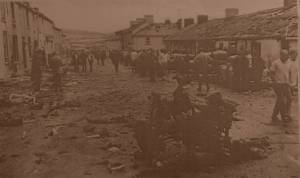
Two men who were sweeping the street but had stopped to help the injured died in the blast too: David Miller and James McClellend. David Miller’s wife was having tea in the Beaufort with Mrs Hamilton when the explosion accrued. Annie Miller had just sat down with her friend, when the second blast devastated the street outside. Both ran into the street where carnage displayed its full horror. The Claudy hotelier would later relate what awaited them on street. It is harrowing. Annie Miller’s husband’s mangled and mutilated body lay on the road. “The only way Mrs Miller could identity him was by the buttons she had sewn on his coat that morning.” she would say. David Miller’s brother Gordon would say “we saw things that no one should ever have to see.”
Within seconds of the second deadly blast at the Beaufort, the third and final of the day went off at the front of the Post Office. Due to the area being cleared no one died as a result.
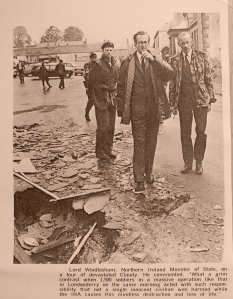
A Fire brigade spokesman would say that the scene was one of absolute carnage:
“Bodies were badly mutilated and doctors and nurses and people were running with bandages from the chemist shop trying to attend the injured. People were literally blown to bits.”
One villager would had fought in both World Wars, earning seven camping medals, related that the worst suffering he had ever saw was at Gallipoli. He would say: “but you knew who your enemies were” he would go on and say “This is worse. I’ve seen nothing as cruel.
As those in Claudy cried and contemplated the day of horrific suffering that had visited their now broken community. Wicked men celebrated, happy in the death they had unleashed on an unsuspecting village. The first warning was received after the first bomb went off.
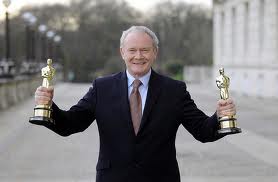 That night Operation Motorman was a success. McGuinness sent out orders that the youth of republican areas should continue to attack the army as they cleared the “No-go” areas. McGuinness dress as a woman fled across the border while others fought his battles. His poor showing in the defence of the “No-go” areas caused other provos to christen him the “actor”. He meet with his close friend who had returned from bombing Claudy, the two travelled to McGuinness’ grandmother’s farm, in Illies region of Donegal, where they hid out together and celebrated the day’s success.
That night Operation Motorman was a success. McGuinness sent out orders that the youth of republican areas should continue to attack the army as they cleared the “No-go” areas. McGuinness dress as a woman fled across the border while others fought his battles. His poor showing in the defence of the “No-go” areas caused other provos to christen him the “actor”. He meet with his close friend who had returned from bombing Claudy, the two travelled to McGuinness’ grandmother’s farm, in Illies region of Donegal, where they hid out together and celebrated the day’s success.
No one ever admitted to the terrible atrocity that took place in the sleepy village of Claudy, on the 31st July 1972. Some senior members of the PIRA initially believed it was an attack carried out by a secret unit of the army to blacken republicans. Why would anyone put three no warning car bombs in the Main Street of a mixed village, with no military? This overshadowed the propaganda coup of the decade for them: large numbers of British troops invading republican areas. Some asked questions, why did Derry not make a stand? Why had the PIRA commander fled leaving children to fight? But most importantly, why had he sent three large no-warning bombs to attack civilians – many Roman Catholic? Many left the PIRA with these questions unanswered.
Within days of the triple bomb attack, the police were aware of the identities of those who had taken part and organised the massacre. What would take place over the next six months would bring shame to the RUC, the Roman Catholic Church and the British Government, particularly the Conservative Party. While those who murdered men, women and children continued unabated. The Triple Cross of Ulster’s citizens took place in an interwoven web of dark intrigue, which would see those guilty of mass murder able to remain free, protected by church and state; some of those would reach the highest pinnacle of political life, while under that protection. The True extent of the cover-up and collision by members of the British Conservative Party, the Roman Catholic Church and the RUC, in protecting PIRA murders, would only be released when those responsible could not face justice.
Next: the reaction and the collusion
Additional reporting by David Nicholl.







